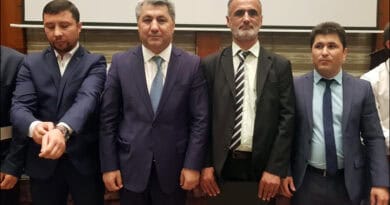In Kyrgyzstan, torture of detainees continues in detention centers
The Coalition against Torture in Kyrgyzstan provided the results of monitoring of the Republic’s temporary detention facilities (TDF) with a view to observing the rights and freedoms of prisoners from torture and other cruel, inhuman or degrading treatment or punishment.
In the course of the study, human rights defenders concluded that torture was most often applied to individuals suspected of committing crimes against property (Articles 200-210 of the Criminal Code of the Kyrgyz Republic), against life (Articles 130-137 of the Criminal Code of the Kyrgyz Republic), against health (Articles 138-145 of the Criminal Code of the Kyrgyz Republic) and in the sphere of circulation of narcotic drugs, psychotropic substances, their analogues and precursors (Articles 267-276 of the Criminal Code of the Kyrgyz Republic). At the same time, the main purpose of torture is to obtain a confession of a crime.
According to human rights activists, the rules and procedures for the placement and detention of internal affairs bodies in temporary detention facilities do not guarantee the effective documentation of torture and cruel treatment, due to the lack of full-time medical staff.
“This gives rise to the problem of timely, complete and high-quality medical examination of persons, who are placed and kept in temporary detention facilities. For every tenth person being placed in TDF, a medical examination was carried out by employees of the TDF. It casts doubt on the achievement of the goals of its conduct, because the TDF’s employee, who does not even have the minimum medical knowledge, is objectively unable to interview the person, do the necessary medical interventions, and assess correctly physical and mental state, which is necessary for effective documentation,” write the report authors.
Another important problem, that human rights defenders draw attention to, is the imperfection of the legal and regulatory framework: documents regulating the order of detention in temporary detention facilities do not establish a time frame between placement in temporary detention facilities and the initial medical examination of newly arrived persons. As a result, torture is not always detected and often simply not documented.
Medical workers of health care organizations, where people from temporary detention facilities are taken to conduct a medical examination, do not fill out the Medical Examination Form No.003-3/y. It raises doubts about the examination in strict accordance with the requirements of the Practical Guide approved by the order of the Ministry of Health of the Kyrgyz Republic. So:
– in 62.5% of cases, a medical examination was limited to a short survey “about well-being of the patient” and there were no medical interventions;
– in 27% of cases, a medical examination came to examination of visible parts of the body without undressing;
– in every third case (38%) the collateral requirement was not met confidentiality during the medical examination.
There are no medical workers in the TDF staff, and the involvement of medical workers from health organizations to provide medical services to detainees has not been organized at the proper level.
“This problem has been identified for a long time and repeatedly, but no specific decisions have been made so far. TDF’s employee, who is at the primary level charged with assessing the physical and mental state of a person in custody, including in order to identify and document torture and cruel treatment, due to lack of his special knowledge, is objectively unable to properly do this, as well as determine the need for treatment,” the report’s authors conclude.
Human rights defenders are worried not only by the low level of service for persons held in temporary detention facilities, but also by the lack of proper sanitary conditions.
“The conditions for maintaining personal and public hygiene have not been created in the TDF: almost every fifth (18%) is not able to take a shower; every second (57%) is not given soap, and 75% of prisoners do not receive toilet paper for hygiene purposes. In almost 80% of cases, items for cleaning the cell are not given out, although this is provided for by the Internal Rules of the TDF,” the authors of the report state.
They emphasize that the practice of imposing on detained persons the obligation to take out and wash the tank with excrements degrades the dignity of both prisoners and staff who are required to oversee such a procedure.
At the same time, human rights activists believe that the conditions for violating standards that require cleanliness and decency in meeting persons deprived and limited freedom of their natural needs, create legal acts that determine the Internal Rules, but do not establish clear requirements for cleaning and disinfection of toilets, their periodicity, leaving the decision of this issue to the discretion of the TDF’s administration.
Also, the authors of the report draw attention to the fact that detainees are not provided with bedding and sleeping accessories. Every tenth prisoner sleeps without a mattress and blanket, and almost 80% do not have a pillow.
As for food, the situation in the temporary detention center is as follows: in different isolators, food is provided a different number of times, depending on the discretion of the administration and its ability to raise funds for food.
At the same time, human rights activists found out that every fifth person kept in the TDF is hungry, because he does not get enough food in portions, and they do not give more.
In addition, the authors of the report found that, among other things, the rights of prisoners in temporary detention facilities to walk are also violated. By international standards, prisoners should stay in the open air for at least an hour daily. However, in most temporary detention facilities, there is no walk itself. It is combined with the detainees’ walk to satisfy their natural needs.




